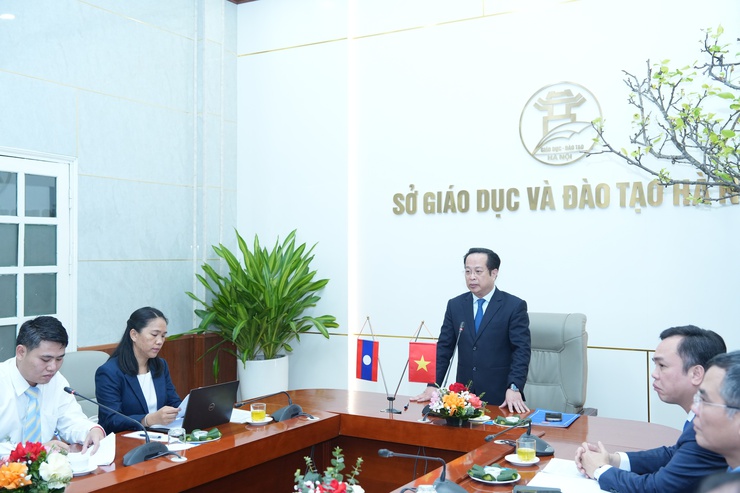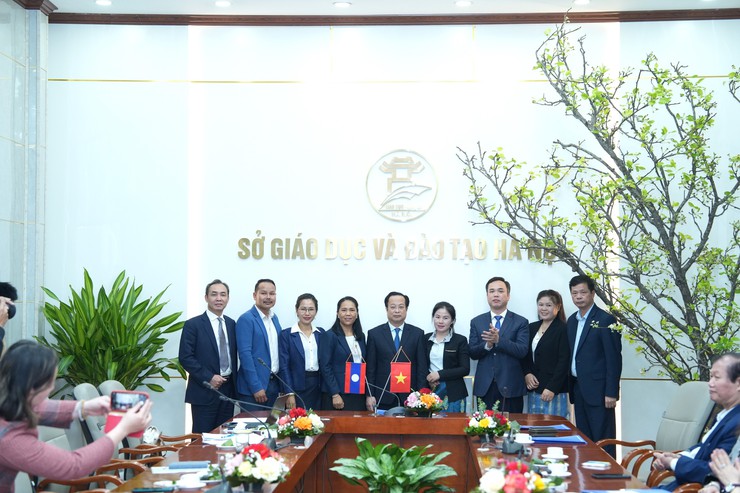Speaking at the event, Director of the Hanoi Department of Education and Training Tran The Cuong said that this program is a key initiative within the education and training cooperation framework between Hanoi and Vientiane. It aims to enhance vocational teaching capacity, contributing to the development of a high-quality workforce for Laos, particularly for its capital, Vientiane.

Director of the Hanoi Department of Education and Training Tran The Cuong.
This significant initiative is part of the implementation of the Cooperation Agreement between the Party committees and authorities of Hanoi, Socialist Republic of Vietnam, and Vientiane, Lao People's Democratic Republic, for the 2022-2025 period.
The agreement was signed on April 4, 2022, in Vientiane. It also aligns with Plan No. 252/KH-UBND, issued on August 21, 2024, by the Hanoi People's Committee, which outlines the training and capacity-building program for vocational teachers in Vientiane from 2023 to 2025.
Director Tran The Cuong highlighted Hanoi's strong commitment to fostering educational and training cooperation between Vietnam and Laos. As the political and administrative center of Vietnam and a major hub for culture, science, education, economy, and international exchange, Hanoi remains a dedicated partner in supporting Vientiane in improving the quality of education and vocational training.
The Hanoi Department of Education and Training is committed to supporting the development of vocational education as part of the shared progress of both Hanoi and Vientiane, as well as the two nations. The training course for vocational teachers from Vientiane includes participation from instructors at the Vientiane Capital Labor Skills Development Center in Laos. The course will run for two months with a total of 200 training hours per program.
To ensure the effective organization of the training program, the Hanoi Department of Education and Training has directed its specialized units to collaborate closely with two institutions responsible for delivering the training: Bac Thang Long College of Economics and Technology and Hanoi Vocational College of Cooking, Tourism, and Fashion. These institutions have been tasked with preparing the best possible conditions for the participants, including accommodation, transportation, training curriculum development, and other necessary support to facilitate a productive learning experience in Hanoi.
Vu Thi Hop, Deputy Head of the Training Department at Bac Thang Long College of Economics and Technology, stated that the course will focus on enhancing participants' knowledge and skills in hair design and graphic design. Before implementation, the school will conduct an assessment of the teachers' current skill levels and specific needs to tailor the program accordingly.

Delegates at the event.
In the field of beauty and hair design, Bac Thang Long College of Economics and Technology has seven years of experience in training, with a faculty comprising industry experts. Regarding graphic design, the school has a strong foundation in information technology training and considers this field to have significant development potential. While the institution has previously sent teachers and students to South Korea and Thailand for study and exchange programs, this marks the first time it is providing direct training to international students on its campus, opening up new possibilities for future international collaboration.
On behalf of the trainees, Faifun Phommachack, a teacher from the Vientiane Capital Labor Skills Development Center, shared her perspective on the importance of vocational education in fostering a sustainable economy. She said that vocational skills not only provide individuals with stable employment opportunities but also contribute to the growth of key industries in society. Improving the quality of vocational teachers is essential for enhancing training standards and meeting the evolving demands of the labor market.
Faifun Phommachack expressed hope that through this training program, teachers would gain access to advanced teaching methodologies, engage in cross-cultural exchanges, and acquire the necessary knowledge and skills to improve the quality of vocational education, aligning with the increasing demands of modern society.